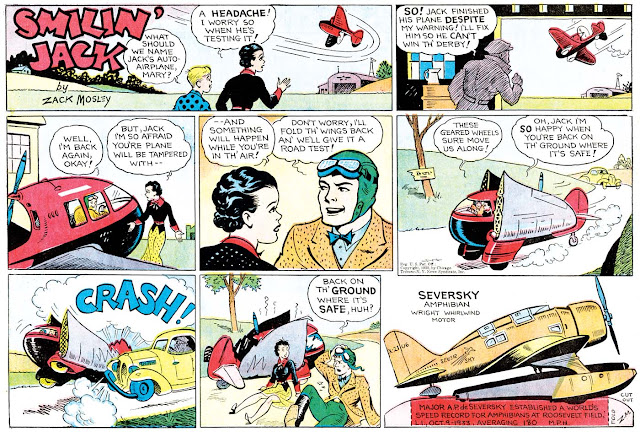Zack Mosley's long-running aviation strip, Smilin' Jack, never really went in much for toppers. In the very early days of the Sunday there was a short-lived feature called Air Facts, but that was even before the feature had gained it's permanent name -- the first few months were titled On The Wing.
The next topper debuted on August 25 1935. It was a cut-out feature that occasionally ran under the title of Smilin' Jack Cut-Out or Smilin' Jack Airport, but was usually untitled. Each week readers could cut out a different model of plane. By the time Mosley tired of the panel feature and discontinued it after October 4 1936*, kids who faithfully cut each one out had quite a collection.
The topper was included in both half page and half-tab formats. I don't have any full tab versions from this era (were they even offered?) so I don't know if that format included it.
Smilin' Jack would go 'topless' for well over a decade before deigning to try a new topper, another factoid feature.
* Source: All dates from New York Sunday News

I didn't realize that a "topper" could consist of just a single panel like this one. Would something like "Kitty Korner" (accompanying "Heathcliff") count as a topper, too?
ReplyDeleteI'd forgotten that once upon a time Jack didn't wear a moustache. That girl looks like Boots with a dye job.
ReplyDeleteHello Allan-
ReplyDeleteIt would seem that Smilin' Jack was only offered as a half and half tab size. I knew Mosely, that is, as a young corresponding fan. He was assembling some reprint collections, using his own file of original proofs in the late 1970's, and I asked him why the Sundays were only in that size. He said that's all there ever was.
I forget the reason he gave; he would tend to prefer to kid around rather than bore himself with retelling dull facts, but my guess is that though it was a long running member of the Trib/News line up, SJ had nowhere near the popularity of their other action adventure series, and so with a small client list, maybe it wasn't worth the extra syndicate production.
Mosely would end his letters with the farewell, "CAVU" (which was pilot argot for "Ceiling And Visibility Unlimited.")
Hi Joshua ---
ReplyDeleteThat is a great question! The definition of topper is a little loosey-goosey. Here is the definition I offered in my book:
"Toppers are auxiliary strip or panel features that accompany the main feature. They are expendable portions of the feature that make reformatting for smaller spaces simpler. ... Although the classical style of topper was all but gone by the 1960s ... other auxiliary titled features, usually a single panel, survive to the present day, like Dick Tracy's Crimestopper's Textbook. Although not toppers in the classical sense, they are documented as such" for continuity's sake.
There is lots of room for argument with that definition, and I welcome anyone who wishes to come up with a definition that allows us to classify toppers separately from what you might call Auxiliary Features. That could be tough to do, because it is seemingly not as simple as strip vs. panel -- I think the many panel auxiliary features to King Features strips of the mid-30s deserve the appellation 'topper', but maybe I'm wrong?
-Allan
Hi Mark --
ReplyDeleteActually Smilin' Jack was offered as a full tab, because I have some in my collection. I have a few from 1934, then a long fallow period, then quite a few starting in 1938, until they finally trail off in 1953 (check out the Baltimore Sun online for late samples).
--Allan
I have come to call those extras like Dinny's Family Album, Popeye's Cartoon Club, the doll cut-outs,, etc. as "Panel Companions" to differentiate them from the actual multiple panel comic strip toppers.
ReplyDeleteThough I do not have a problem with anyone referring to them as toppers.